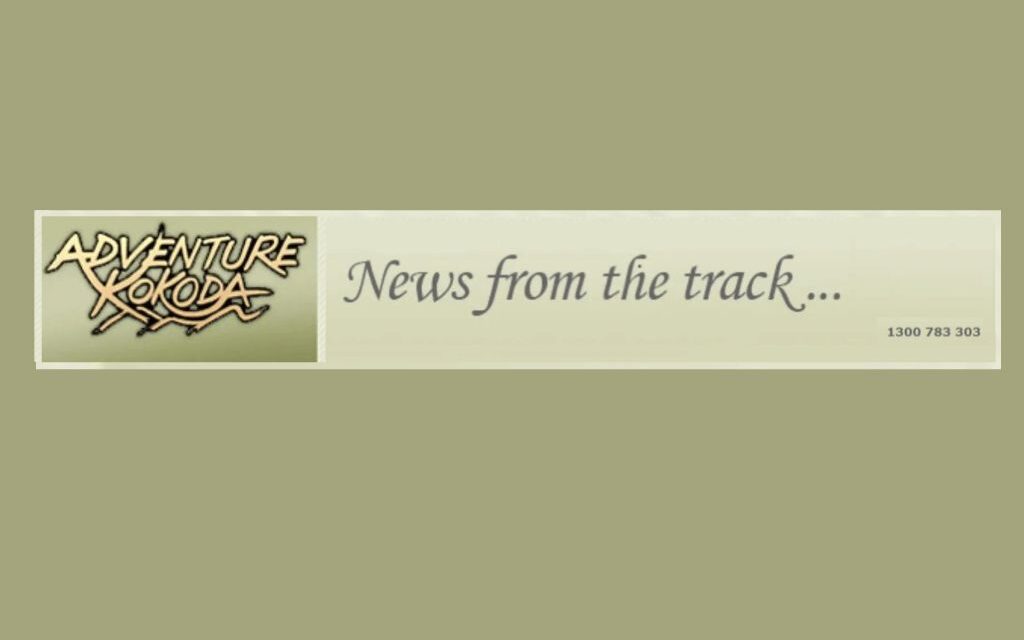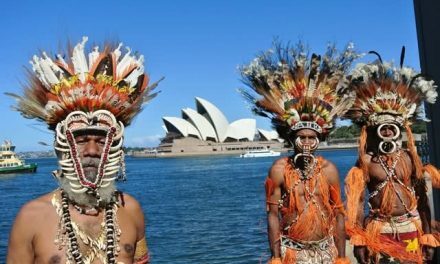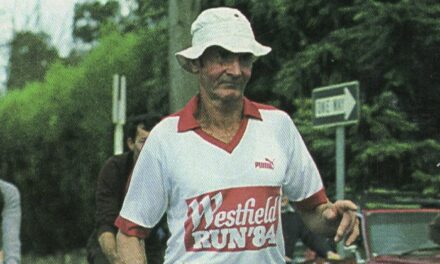This content has been archived. It may no longer be relevant
The following blogs were written 15 years ago soon after Australian officials assumed management control of the Kokoda Trail on eye-watering 6-figure salaries loaded with generous allowances and tax deductions.
Back then Kokoda tour operators held high expectations that some order would be brought to the management chaos along the Trail and that military heritage sites would be restored and interpreted with commemorative memorials.
All they had to do was listen to those who has been operating on the Trail for the previous 17 years, and the village based landowners.
They failed on both accounts!
The only avenue we therefore had to highlight our concerns was via our website blogs.
In 2009 the Australian CEO, Rod Hillman, advised:
:‘. . . it is a KTA responsibility to develop systems to improve the trekker experience – whether through campsite bookings, itinerary planning, and accreditation of Tour Operators or developing training programs. He also advised that among their objectives they wanted:
‘An improved standard of living, quality of life, and access to basic services for communities along the Kokoda Track corridor; Improved opportunities for income generation, through by sharing benefits from tourism on the Kokoda Track, through better distribution of trekking fees and development of local income generation opportunities (business and employment).’
We responded:
‘Kokoda is in danger of being transformed into a monument to environmentalism rather than a living memorial to our diggers’ and that whilst there has obviously been a great deal of departmental activity in regard to the Joint Understanding I can report that, after 15 months, there has not been a single outcome on the track – for example:
. There is no credible Trek Permit system in place;
. There is no campsite booking system:
. There is no trek operator accreditation system;
. There is no standardised medical clearance form for trekkers;
. There is no co-ordinated system for medical evacuations in place;
. There is no campsite accreditation system in place;
. There is not a single environmental toilet between Owers Corner and Kokoda;
. There has been no attempt to identify clan leaders and landowners along the track;
. There has not been a single village-based workshop along the Trail to identify local needs;
. There is no minimum standard of pay and conditions for PNG trek guides and carriers;
. There is no training or development system in place to assist villagers to ‘value-add’ to the pilgrimage;
. No action has been taken to identify (and make safe) unexploded ordnance along the trail; and
. There is no plan to upgrade the road between Sogeri and Owers Corner to a safe all-weather standard.’
Fifteen years on, in 2024, not one of the above issues has been addressed and, as a result, Kokoda tourism numbers have fallen by 46%.
Since then numerous Canberra officials, advisers and consultants have returned to Australia financially enriched without leaving a single management protocol in place; without building a single hygienic toilet; and leaving Kokoda tourism in a much poorer state than when they arrived.
Extracts from blogs posted on in May-June 2009:

Blog posted by Charlie Lynn, 13 May 2009
‘The news that the interim Executive Officer of the PNG Kokoda Track Authority, Annette Dean, quit her job and returned home to Tasmania is no surprise. She cited death threats, corruption and daily demands for money as the normal challenges she faced in her job. She needed a security escort to get from the carpark to her office in Boroko each day . . .
‘Annette’s credentials for the job were never in question but whoever made the decision that a white woman could work effectively in the KTA office environment in Boroko was naive in the extreme. They certainly did not listen to her predecessor, Warren Bartlett.
‘Warren, who has been in PNG for more than 40 years, ran the KTA office since the organisation was established in 2004. He faced two major challenges on a daily basis. One was running the entire trekking operation across Kokoda without any effective staff support. The other was dealing with an unqualified Board who used subtle and not so subtle methods of intimidation to get access to substantial amounts of money from treks fees and elaborate scams with their wan-toks in local, Provincial and National government.
‘Neither the Australian nor PNG governments were interested in the management of the Kokoda Trail at that time. He was on his own.
‘Adverse public reaction to a proposal to mine part of the track caused them to focus on a solution to protect the military heritage of the area. By this time the Board had effectively misappropriated more that a million kina in Port Moresby and embezzled more than a quarter of a million more from the bank. Nothing was flowing through to the villages who were forced to compete amongst themselves for trekkers business along the track. It pitched brother against brother. Clan against clan. Village against village. Koiari against Orokaiva.
‘Within a short period of time committees, consultants and conferences became the order of the day as Canberra began the task of ‘assisting’ PNG to obtain a World Heritage listing for the Kokoda Trail and the Brown River Catchment Area. Most observers thought this was a bit ambitious in a country with a system of customary land ownership.
‘Working from the top down – as they do in Canberra – departmental bureaucrats visited villages along the track by helicopters to familiarize themselves with ‘village needs’.
- They ignored advice from trek operators who have been operating along the track for up to 20 years.
- They ignored previous research from village and stakeholder workshops and refused to continue that process.
- They refused to engage people with extensive experience in Melanesian culture and language.
- They refused to trek with established companies who focus on the military history of the Kokoda campaign in order to understand the significance of the pilgrimage.
‘It was soon apparent that Canberra was operating in a parallel universe. Trek operators were left to make their own arrangements as they conducted academic conferences in Canberra, took advice from armchair experts who once had a ‘Kokoda experience’, and continued to rotate people with no experience in Melanesian culture through the country.
‘After 15 months of frenetic activity not a single management measure has been implemented for the track. It could be argued that the system has regressed. The office is no longer accessible on a 24 hour basis and the link between villagers and management seems to have been broken.
‘Annette Dean’s departure is a wakeup call. Australia needs to draw a line in the sand and admit they have got it badly wrong over the past 15 months.
- They need to immediately cancel any plans for ‘experts’ scheduled to conduct track analysis and assess village needs.
- They need to engage people familiar with Melanesian language and culture. They need to identify clans and landowners along the track.
- They need to acknowledge that Kokoda is a military historical pilgrimage and not an exclusion zone for eco-evangelists.
- They need to work in partnership with trek leaders, clan leaders, landowners and Local/Provincial government officials.
‘Let’s hope that Annette Dean’s negative experience can be used in a positive way.’

Blog posted by Charlie Lynn, 20 May 2009
‘But Kokoda is in danger of being transformed into a monument to environmentalism rather than a living memorial to our diggers.
‘The custodians of our military history seem to have been sidelined in the process of developing the track between Owers Corner and Kokoda as a memorial trail.
‘In last year’s five page ‘Joint Understanding between PNG and Australia on the Kokoda Track (sic) and Owen Stanley Ranges’ the word ‘memorial’ or ‘battlesite’ is not mentioned – once!
‘Military heritage’ has been replaced by ‘World heritage’.
‘The Joint Understanding commits to ‘deploying experts to the PNG Department of the Environment and Conservation to facilitate PNG Government processes to enable identification and consideration of a proposed World Heritage Site, etc. etc’. No mention is made of deploying military historians to identify battlesites sacred to our heritage, to dispatch bomb disposal experts to assess the dangers of unexploded ordnance along the track, or experts from our War Memorial to establish a similar institution in Port Moresby. The preservation of our joint military heritage does not rate a mention.
‘Trekker numbers have grown exponentially over the years – from 76 in 2001 to more than 6000 in 2008. We watched as an inexperienced and unqualified authority was established to manage our sacred ground along the track. We watched as it morphed into a self-indulgent system of corruption. We have calculated the benefits to the PNG economy to be around $15 million dollars in 2008 but we shy away from the fact that very little reaches the villages along the track. It is little wonder that landowners are attracted to mining and forestry opportunities.
‘The Australian – PNG Joint Understanding committed to ‘addressing immediate needs for the 2008 trekking season and create interim Kokoda Track management arrangements’. This is the most important priority when the froth and bubble has been cleared from the document. But as thousands of Australians make the pilgrimage across the track we failed to meet this key commitment. Nothing happened.
‘And as we are now well into the 2009 trekking season and still nothing has happened!
‘Rumour has it that there is much feverish activity in the parallel universe of the Department of Environment, Heritage and the Arts in Canberra. This activity is obviously directed towards the application for a World Heritage Listing for the area.
‘It is time we said good bye to this well-intentioned but misguided concept.
‘It’s time we refocused on the need to preserve and honour the military historical integrity of the Kokoda Trail. There are plenty of other areas in Papua New Guinea where eco-evangelists can get their rocks off. They should be encouraged to go and find them.
‘We need to ensure departments entrusted with the preservation of our military heritage such as the Australian War Graves Commission, the Australian War Memorial, Defence and our ex-Service community have input into assisting our Papua New Guinean cousins to care for our sacred sites from the Pacific War.
‘We need to demonstrate that villages along the Kokoda Trail, and other battlesites throughout Papua New Guinea, will have a sustainable economic future as a result of our emerging interest in the Pacific War. This is key to the future of the track!
‘Kokoda is a pilgrimage for those who had a relative serve in the war. It is a ‘rite of passage’ for young Australians from different lands and cultures. It is a bridge for those who want to learn more about our military history and our Melanesian neighbours.
‘In the recent budget the Government announced $10 million dollars to develop an interpretive trail in France and Belgium so that visitors to the area can understand the contribution and the sacrifice Australians made for freedom.
‘In the same budget absolutely nothing was allocated towards the development of an interpretive trail between Owers Corner and Kokoda!
‘For this reason alone the responsibility for the development of the Kokoda Trail as a National Memorial Trail should be transferred to the Australian War Graves Commission.
‘The Department of Environment, Heritage and the Arts should continue with their assistance to achieve World Heritage listings in partnership with their Papua New Guinea counterparts. There is much to be done to provide a sustainable alternative to the ravages of the logging and mining industries in the country. A review of Ministerial Media Releases indicates that these areas are their raison d’être – of the 340 media releases issued over the past 12 months only one refers to Kokoda!
‘Now we understand why the words ‘military heritage’ and ‘memorials’ were not included in the Joint Understanding signed over 12 months ago.
‘Now we understand why nothing has been done – apart from a few smoke and mirror demonstrations – across the Kokoda Trail during the past two trekking seasons.
‘Now we understand why the responsibility for the preservation of our military heritage along the Kokoda Trail has not been given the due attention it urgently needs it must be reallocated to the Office of the Australian War Graves Commission as a matter of priority.’

Rod Hillman, was the Australian CEO appointed by Canberra – response posted on19 May 2009
‘The KTA is responsible for collecting the trek permit fees, managing the Track and distributing a proportion of the trek fees to the land owners.
‘As such it is the day to day manager of the Kokoda Track and it is a KTA responsibility to develop systems to improve the trekker experience – whether through campsite bookings, itinerary planning, and accreditation of Tour Operators or developing training programs.
‘KTA’s sole income is from Trekking Permit fees – no government or other ongoing assistance. It is a tight budget and there is a strong desire to put a significant proportion of the trek permit money into the land owners’ hands. It is their land and they should get some return.
‘The Australian Government and the Australian people have a strong connection to, and a reverence for, the Kokoda Track. As such a joint understanding between the PNG and Australian Governments has been created to, among other objectives;
- An improved standard of living, quality of life, and access to basic services for communities along the Kokoda Track corridor.
- Improved opportunities for income generation, through the following:
- Sharing benefits from tourism on the Kokoda Track, through better distribution of trekking fees and development of local income generation opportunities (business and employment)
- Improved access to markets (transport) for other income generation opportunities
- The preservation of social and cultural values of the World War II route.
- The impacts of trekking are managed to deliver clear net environmental benefits for the Kokoda Track Communities.
- The World Heritage values of the Kokoda Track and Owen Stanley Ranges are understood and where appropriate, protected.
‘This commentary is to reassure the readers that the KTA takes its role very seriously and has a commitment to tour operators, trekkers and the local communities. We are all working towards preserving the memory of those soldiers in 1942, providing an experience for trekkers that is life changing and allows people to appreciate and understand the conditions the soldiers fought in and the sacrifice they made, for trekkers to learn of the people who live on the Track – ancestors of those who provided such unstinting support and to acknowledge and respect their ownership of the land.
‘Please judge the KTA on what it does in the future and not on what it used to do. If in a year there is the same mistrust and concerns then I would have failed and I will be brought to account accordingly’.

Blog posted by Charlie Lynn, 1 June 2009
‘Whilst I believe the pursuit of a World Heritage listing is a noble goal it should not be at the expense of the historic military significance of the Kokoda Trail.
‘I believe the Kokoda Trail should be developed as a national memorial trail that reflects the military significance of the Kokoda campaign.
‘This should be separated from the feasibility study for a World Heritage nomination for the broader Owen Stanley Ranges and be reallocated to the Office of the Australian War Graves Commission.
‘Of more concern is the fact that the Joint Understanding does not contain any references to the military significance of the Kokoda Trail. The words ‘Kokoda campaign – military history – memorials – battlesites – etc’ do not rate a mention in the entire document. I regard this as a serious omission.
‘Whilst there has obviously been a great deal of departmental activity in regard to the Joint Understanding I can report that, after 15 months, there has not been a single outcome on the track. For example:
- There is no credible Trek Permit system in place
- There is no campsite booking system.
- There is no trek operator accreditation system.
- There is no standardised medical clearance form for trekkers.
- There is no co-ordinated system for medical evacuations in place.
- There is no campsite accreditation system in place.
- There is not a single environmental toilet between Owers Corner and Kokoda.
- There has been no attempt to identify clan leaders and landowners along the track.
- There has not been a single workshop in either the Koiari or Orokaiva areas on the track to identify villager needs.
- There is no minimum standard of pay and conditions for PNG trek guides and carriers.
- There is no training or development system in place to assist villagers to ‘value-add’ to the opportunities presented by trekkers passing through their villages.
- No action has been taken to identify (and make safe) unexploded ordnance along the trail.
- There is no plan to upgrade the road between Sogeri and Owers Corner to a safe all-weather standard.
‘The land in question is owned by traditional Koiari and Orokaiva landowners. The tracks connecting villages between Owers Corner and Kokoda have special significance to our military heritage because of the desperate campaign fought across it during the period 27 July to 2 November 1942.
‘Clans along the Kokoda Trail are the custodians of land sacred to our military heritage. They will protect and nurture our battlesites provided they receive benefits for doing so.
‘Villagers are currently missing out on significant potential earnings because they are yet to be taught the concept of ‘value-adding’.
‘Teaching them to wash and dry trekkers gear, brew coffee, bake scones and produce village billum bags is not PhD stuff. This year they will miss out on the opportunity to earn at least PNGK 1 million because of a lack of basic training in these areas.
‘The construction of interpretative memorials at significant sites on their land will also provide them with an incentive to further ‘value-add’ to a trekkers Kokoda experience.
‘I recommend that responsibility for the development of an interpretive trail between Owers Corner and Kokoda be transferred from the Department of Environment, Heritage and the Arts to the Office of Australian War Graves.’

Blog posted by Charlie Lynn on 10 August 2009
‘There is an urgent need for a re-assessment of Australia’s role in the protection of our military heritage along the Kokoda Trail.
‘The construction of conventional buildings at Owers Corner and steel wire rope swing bridges across creeks at significant battlesites is akin to desecration of the most significant symbol of our involvement in New Guinea during the Pacific War.
‘Whilst Australia’s assistance for the Owen Stanley Ranges to be listed as a World Heritage Area is a noble cause our commitment to the preservation of the military heritage of the Kokoda campaign is misguided. It is therefore urgent that responsibility for the development of Kokoda as a military interpretive trail be re-allocated to the Office of Australian War Graves.
‘This will allow the Department of Environment, Water, Heritage and the Arts to focus on its area of expertise in assisting the PNG Government to achieve a world heritage listing for the Owen Stanley Range.
‘In the meantime the Australian Government should immediately withdraw from any planned projects between Owers Corner and Kokoda. Any assistance should be limited to training local communities in appropriate social and community development in partnership with the PNG Department of Community Services.
‘Kokoda Airfield
‘At the other end of the trail the airfield at Kokoda is also a disgrace. The terminal consists of a concrete slab with a metal roof without walls. There is virtually no seating and no toilets. The paying customer, i.e. trekkers, deserve better.
‘Since 2001 more than 20 thousand Australians have invested around $100 million to trek across the Kokoda Trail. The GST element of these funds would be sufficient to upgrade the road between Sogeri and Owers Corner and the airfield at Kokoda to safe and respectable standard.
‘The villagers between Owers Corner and Kokoda are now earning more income than ever before. More than $1 million a year is received in wages and campsite fees. The next important step is to teach them how to work together for the greater benefit of their local communities. The proper PNG agency for this work is the PNG Department of Community Services but thus far they have never been consulted or approached.
‘There is scope for the villagers to increase their earning potential through the maintenance of the trail in preparation for each trekking season. Such maintenance should not be contracted out, as currently planned, because local people along the trail are more than capable of completing this type of work on their land.
‘In the last budget the Australian Government allocated $10 million to the Office of Australian War Graves for the development of an interpretative trail in France and Belgium to honour the sacrifice of our World War 1 veterans. The work will be completed in time for the centenary of our ANZAC landings on the Gallipoli peninsula.
‘The Office of Australian War Graves has a proud record in regard to the development and maintenance of our war graves in foreign lands. The expertise they have, and will further attain as a result of the latest budget allocation, should be applied to the Kokoda Trail which is our World War 11 equivalent.
‘Conclusion
‘More detail is available in the following submissions which have been largely ignored this far:
- http://niusleta.kokodatreks.com/documents/StrategicPlanfortheKokodaTrailNoPics_000.pdf
- http://niusleta.kokodatreks.com/documents/ADiscussionPaperontheKokodaEcoTrekkingIndustryNoPics.pdf
- http://niusleta.kokodatreks.com/documents/KTAReportbyPaulMitchell17November2006.pdf
- http://niusleta.kokodatreks.com/documents/ManagementFramework-KokodaTrackbyPaulMitchell.pdf
- http://niusleta.kokodatreks.com/documents/KTADiscussionPaperbyWarrenBartlettNovember2007.pdf
‘Action Required
‘PNG Tourism should commission a research agency to determine why people trek Kokoda and what they would like to see in regard to the future development of the Kokoda Trail.
‘The PNG Kokoda Track Authority should be required to develop a proper management plan for trekking operations across the Kokoda Trail. This includes the certification of trek operators and campsites, the issue of trek permits, a medical insurance plan for PNG guides and carriers, the identification of landowners, a dispute resolution system, a website that allows for trekkers to provide comment on their experience, etc.
‘The Office of Australian War Graves should commission an interpretative memorial plan for the Kokoda Trail.
‘Recommendations
- The Office of Australian War Graves be allocated responsibility for the development of an interpretative trail between Owers Corner and Kokoda.
- The Australian Department of Environment, Heritage, Water and the Arts continue to work in partnership with the PNG Department of Environment and Conservation to achieve a World Heritage listing for the wider Owen Stanley Ranges.
- PNG Tourism commission a study into the capacity of local airlines and hotels to meet the demand of eco-tourism.
- The PNG Department of Community Services develop plans for the development of Community Learning Development Centres in villages along the trail.
- The PNG Kokoda Track Authority developing a proper management plan for the Kokoda trekking industry.
- PNG Tourism and the PNG Department of Community Services facilitate workshops in selected villagers in Central and Northern Province to determine village community needs and develop short and long term plans.





